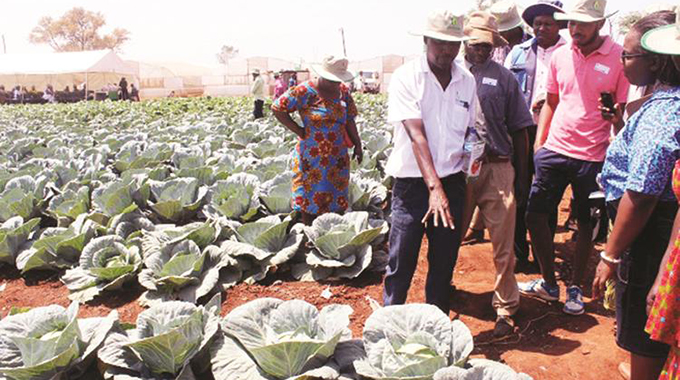
Obert Chifamba Agri-Insight
THE difficult economic terrain we are traversing as a country requires fresh produce farmers to find ways of remaining on the cutting edge and employing new solutions their markets have not seen before.
Essentially, it does not require rocket science for one to realise that everything happening now is just not what it is expected to be – there is the volatile inflation to contend with on the one hand and the Covid-19 pandemic on the other that all makes it very difficult for such farmers to conduct their business profitably.
And, incidentally, fresh produce farmers were among the hardest hit when the country started its lockdown in March, as movements to markets were temporarily halted with the Government rolling out a raft of measures to contain the pandemic.
However, the Government later eased the restrictions on the farmers to enable them to escape blanket losses that could have seen the bulk of them out of business if no such action had been taken.
Besides being destructive and disruptive, the Covid-19 pandemic as expected to bring out the farmers’ innovativeness in times of challenges so that they remain in business even after the disaster has ebbed but this does not seem to be the situation on the ground.
A friend of mine recently attended a funeral in Goromonzi, Mashonaland East and returned with lots of fresh vegetables, which he said were for free from one farmer who had run out of ideas as to where she could market her leaf vegetables since the markets were flooded and prices had nosedived making it unviable to travel to Harare and sell the commodity. My friend also revealed to me that many other farmers were facing the same predicament with some reportedly contemplating feeding the vegetables to their cattle so that they will not rot in their gardens.
While the situation is disturbing, it also brought to the fore, the farmers’ lack of innovativeness in the face of challenges.
It revealed that the farmers are not doing market research and are just producing some commodities because their colleagues or growers elsewhere are doing it.
The farmers need to be conversant with market trends so that they know what products to produce and the time to do so and also have some diversity in their product portfolios so that when one of them fails to perform well then the others will come in handy and cover the gap.
Fresh produce farmers are sometimes their own worst enemies because they are not flexible in the way they do business.
What is critical is for them to know what the markets require and also to be aware of their competitors’ game plan to survive.
For now, leaf vegetables like rape, sugar loaf and even cabbages are flooding markets, which makes them barely profitable so the astute farmer needs to produce other vegetables like carrots, peas, broccoli, sweet potatoes and Irish potatoes to name just a handful.
These vegetables are currently not readily available on the markets and any farmer who is selling them is sure to make some decent pickings.
On the other hand, the farmers should also learn to do crop rotation, which is one way of bringing crop diversity and some kind of marketing strategy. I hear there is currently a scramble among the farmers to establish tomato seedbeds and one sure thing is that those tomatoes will flood the market at some point and farmers will record losses yet common sense should dictate that a different crop now would be an answer to these market problems haunting the farmers now.
Those farmers with abundant leaf vegetables may also need to harvest and dry them and later seek markets without pressure.
Dried vegetables have ready markets in places such as Victoria Falls, Kariba and most parts of Matabeleland region where climatic conditions are not conducive for vegetable production. One other thing is that with the current noises on eating healthily, many people are preferring dried vegetables to fresh ones while the value for the former is naturally higher than that of the latter.
It may also make a lot of sense for these farmers to consider traditional vegetables such as ‘muboora,’ ‘nyevhe,’ ‘mowa,’ ‘mujakari,’ and even ‘tsunga’ to sell as both fresh and dried to make money and not just restrict their focus to contemporary vegetables.
Traditional vegetables are also reputed for their high value both in terms of nutrition and earnings, which will be plus for the farmers since they are produced with minimal if any costs. They also do not require a lot of agronomic knowledge other than making sure there is enough manure for food and adequate moisture as well, which in most cases comes from natural rains.
Farmers only need to harvest them for disposal either dispose as fresh produce for immediate sale and consumption or dry for later marketing. This way, they will be covered from outright losses should conventional vegetables perform poorly on the markets. Drying vegetables for selling later is also one way of coping with challenges posed by the Covid-19 pandemic that has constricted market opportunities for farmers and all other people in business alike.
It is, however, disheartening to note that farmers from areas such as Goromonzi, Murehwa, Seke, Domboshava and Mutoko are losing tonnes and tonnes of fresh produce at the moment because prices being offered at the markets are far from being viable rendering them unable to take produce to the market and return with decent earnings.
These farmers need to do surveys on what products are trending on the markets and where else such commodities are being produced so that they go to the market prepared for the possibility of switching to Plan B should the need arise.
This scenario in which they are always caught flat-footed has always left them licking bruised egos yet they do not seem to learn from such experiences and continue to go to the markets without doing their research.
